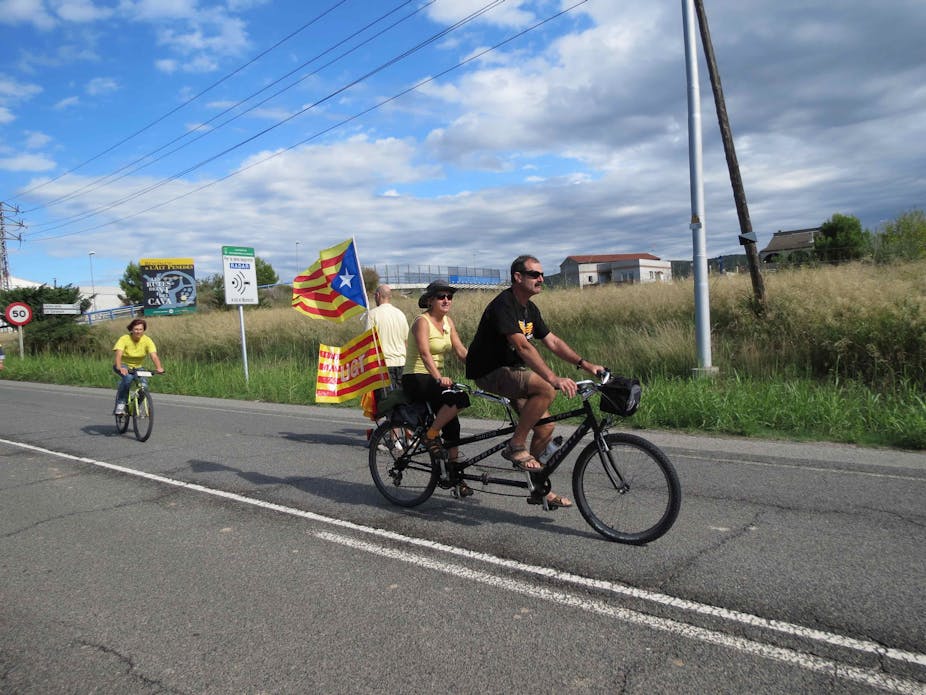Welcome to Breaking Nations, a series of articles that examines independence movements across the globe ahead of the Scottish referendum in September. To begin, Dani Cetrà gives us the view from Catalonia.
Spanish Prime Minister Mariano Rajoy insists that a referendum on Catalonian independence is not going to be held. But that didn’t stop Artur Mas, president of the Catalan Government and head of centre-right party Convergence and Union (CiU), announcing an agreement with the leaders of the Republican Left of Catalonia (ERC), the Initiative for Catalonia Greens (IC-V) and the radical left-wing Popular Unity Candidates (CUP) concerning the date and the questions for a vote.
Mas announced that the voting would be held on 9 November 2014 and that the following questions would be posed to Catalans: “Do you want Catalonia to be a state?”, and for those respondents answering yes, “Do you want Catalonia to be an independent state?”

Rajoy puts forward two complementary arguments about why the vote won’t happen. First, under the current Spanish constitution, referendums can only be called by the central government in Madrid. Second, the constitution enshrines the indivisibility of the Spanish nation and establishes that national sovereignty belongs to the Spanish people. As a result, even if there were to be a referendum it should be all across Spain.
The debate is partly about competing visions of democracy. Rajoy and other political leaders believe the constitution guarantees democracy. Pro-referendum politicians argue that Catalans have the right to decide their political future and that this democratic principle should be given priority over strict readings of the constitution.
There are also competing visions on nationhood and sovereignty. There is an implicit and unsolved disagreement about whether Spain contains one or more “nations”. This leads to another disagreement over which is the relevant political unit entitled to self-determination - Catalans, in this case, or the Spanish people as a whole. Note that this is an important difference to the Scottish referendum. Scotland’s recognition as a nation was arguably a precondition for the October 2012 Edinburgh Agreement.
Aside from the arguments about Spain and the constitution, there is much discussion about how independence would affect Catalonia. Mas argues that Catalonia would be in a better economic position if it had the tools of a state, while Rajoy maintains it would be poorer and would be left out of organisations such as the EU.
These arguments may sound familiar to readers who follow the Scottish debate. But by and large the discussion on Catalonia’s political future lacks detail and depth. Key issues such as the political structure of an independent Catalonia are not being properly addressed. This can mostly be explained by the fact that the debate has largely focused on whether there should be a vote.
And even this has officially come to a halt. On 21 February the Spanish Parliament voted overwhelmingly against “the secessionist plan of the Catalan government,” and on 11 March Rajoy declared in the senate that he is not “willing to discuss the annihilation of the national sovereignty.”
That is certainly not the end of the matter, though. On 8 April a delegation of Catalan leaders will call on the Spanish government to hand the Catalan Parliament legal powers to hold a referendum, but the plea is expected to be rejected.
Does this mean this is a dead-end street? When the request is rejected, the Catalan Parliament will pass its own bill to hold what could be described as a “popular consultation”, given that the result would not be legally binding.
In the event that the consultation is not allowed to take place, Mas’ Plan B is to call for a plebiscitary election that would be held between the end of 2014 and the end of 2016. But this is also uncertain, as CiU does not have a unanimous position and anti-referendum parties have already made clear that they will take it as a regular election.
Third ways are still possible, of course. Alfredo Pérez Rubalcaba, the leader of the Spanish Socialist Workers’ Party (PSOE) has made several calls for the constitution to be amended to allow for a federal system of government, but this proposal so far includes little content.
Some commentators suggest that Rajoy might be more inclined to make political offers to Catalonia after the campaign for the May European elections.

It also remains to be seen how things will be affected by the ruling of the Spanish Constitutional Court on 25 March. The Court ambiguously said that there is no differentiated Catalan political sovereignty but the right to decide can be constitutional as long as it is understood as a political aspiration to be achieved within the framework of the constitution.
As things stand it is far from clear how the Catalan situation will develop. Much will depend on the two governments’ willingness to talk to one another during the next few months.

